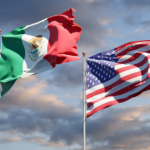After a three-week closure, the Bridge of the Americas (BOTA) connecting Ciudad Juárez, Chihuahua, to El Paso, Texas, is once again open for cargo traffic. This decision was eagerly awaited by the business community. The United States Customs and Border Protection (CBP) has resumed cargo processing after temporarily suspending operations to assist in handling migrants crossing unofficial areas into the United States.
CBP has confirmed the reopening of the BOTA cargo facility on its regular schedule from 6 a.m. to 2 p.m., Monday through Friday, although with certain undisclosed operational adjustments.
Before the closure, BOTA processed approximately 500 northbound trucks daily. Despite the reopening, CBP continues to encourage the business community to explore other nearby facilities, such as the Ysleta, Marcelino Serna (Tornillo), and Santa Teresa ports.
However, it’s important to note that the BOTA closure and stringent truck inspections at other border crossings have caused significant delays for northbound trucks in recent weeks. The Mexican National Chamber of Trucking reported that over $1.5 billion worth of goods have been held at the Chihuahua-Texas border due to these rigorous inspections aimed at detecting illegal entries of migrants and narcotics.
Miriam Kotowski, President of Tecma Transportation Services, a logistics company that frequently uses commercial crossings between Ciudad Juárez and El Paso, is optimistic about the reopening of the Bridge of the Americas and how it will contribute to reduced crossing times. Nevertheless, she has highlighted that inspections by the Texas Department of Public Safety at other entry points are negatively impacting cross-border cargo traffic flow, considering them as trade impediments.
President López Obrador has expressed his intention to send a diplomatic communication to his U.S. counterpart expressing the Mexican government’s opposition to these truck inspections carried out by the Texas government. He asserts that these inspections harm both nations and affect economic activity and people’s mobility. The Mexican Ministry of Foreign Affairs (SRE) has communicated this concern to the U.S. government and requested the restoration of commercial flows through the affected border crossings. The Mexican government has reaffirmed its commitment to working towards fully restoring operations.
The reopening of the Bridge of the Americas is a positive step towards revitalizing trade between Mexico and the United States, and the business community enthusiastically welcomes this news. Nonetheless, challenges persist with rigorous inspections at other crossings, presenting an obstacle to the smooth flow of goods. The Mexican government is taking diplomatic measures to address this situation and ensure better commercial integration between both countries.









